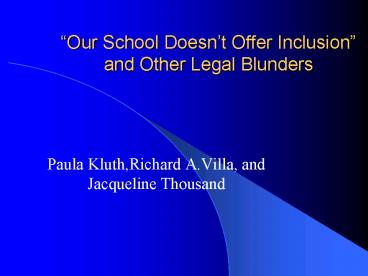Our School Doesnt Offer Inclusion and Other Legal Blunders - PowerPoint PPT Presentation
1 / 10
Title:
Our School Doesnt Offer Inclusion and Other Legal Blunders
Description:
Paula Kluth,Richard A.Villa, and Jacqueline Thousand. Changes in Education ... inclusive schooling, ruling that every child is eligible ... Page 462 questions ... – PowerPoint PPT presentation
Number of Views:67
Avg rating:3.0/5.0
Title: Our School Doesnt Offer Inclusion and Other Legal Blunders
1
Our School Doesnt Offer Inclusionand Other
Legal Blunders
- Paula Kluth,Richard A.Villa, and Jacqueline
Thousand
2
Changes in Education
- Education for All Handicapped Children Act
- -Guaranteed that all students w/disabilities
would receive a - public education
- 1975 changed in 1997 to.
- Individuals w/ Disabilities Education Act
- -inclusive schooling, ruling that every child is
eligible to receive a free and
appropriate education and to learn in the
least restrictive environment possible.
3
Policy Guidelines
- Schools districts cannot use the lack of adequate
resources as an excuse for failing to make a free
and appropriate education available, in the least
restrictive environment, to students
w/disabilities. - There is still a fight for for inclusion although
there has been a slight change from 1977 to 1990. - It has been found that officials arent enforcing
the policy and they have been moving the children
to different districts or segregated classrooms. - Although the law has been in effect for several
years educators and administrators still dont
know how to implement it.
4
Our School Doesnt Offer Inclusion
- There are some schools who claim to not have
inclusion. They say that they have tried it but
it didnt work. - Special education is not a program or a place,
and inclusive schooling is not policy that
schools can outright dismiss. - A student with a disability should be educated in
the school he/she would attend of not identified
as having a disability.
5
She Is Too Disabled to be Educated in a Regular
Classroom
- Many teachers and families have the common
misperception that students with disabilities
cannot receive an inclusive education because
their skills aren't close enough to those
students w/o disabilities. - Students with disabilities, however, do not need
keep up with students w/o disabilities to be
educated in inclusive classrooms they do not
need to engage in the curriculum in same way that
disabilities do and they do not need to practice
the same skills that students w/o disabilities
practice.
6
Supports, Aid and Services
- Assistive technology
- Education consultant
- Therapist
- Peer tutors
- Different seating
- Modified assignments
- Adapted materials
- Environmental support
- Paraprofessional support
- Curriculum has been modified to meet the needs
of the learner. - Schools do not need to provide every support
available, but they must provide those required
by the student with disabilities.
7
Court Case
- Families do not prove to the school that a
student w/disabilities can function in the
general classroom. - In Oberti v. Board of Education of the Borough of
Clementon School District, a U.S. circuit
determined that the neighborhood school of Raphel
Oberti, a student with Downs syndrome, had not
supplied him with the supports and resources he
needed to be successful in an inclusive room. - The judge also ruled that the school had failed
to provide appropriate training for his educators
and support staff. The court place d the burden
of proof for compliance with the laws inclusion
requirements squarely on the school district and
the state instead of on the family. - The federal judge decided, Inclusion is a right,
not a special privilege for a select few.
8
We Offer Special Programs Instead of Inclusion
- Autistic Center- explain
- Separate programs and classrooms exist for
students identified with certain labels. - School districts that automatically place
students in a predetermined type of school solely
on the basis of their disability or perceived
level of functioning rather than on the basis of
their education needs clearly violate federal
laws.
9
Benefits of Understanding the Law
- Reviewing the intent and language of the
Individuals w/ Disabilities Education act will
help administrators shape district wide or
school-based policies and procedures evaluate
the ways in which programs are labeled and
implemented and make more informed decisions
about student assessment placement, and service
delivery. - Page 462 questions
- School district leaders and school principals
who understand the federal law can avoid
lawsuits, enhance education experiences for
students w/ and w/o disabilities, and move toward
the development of school communities that are
egalitarian, just and democratic for all.
10
Questions??
- How effective is half day regular instruction and
half secluded special education? - With so many problems in education today, how
could the responsibilities of teachers be doubled
without really fixing the problem? - Have you thought about starting to change the
curriculum for become a teacher so that they can
be educated on how to teach all types of student?































